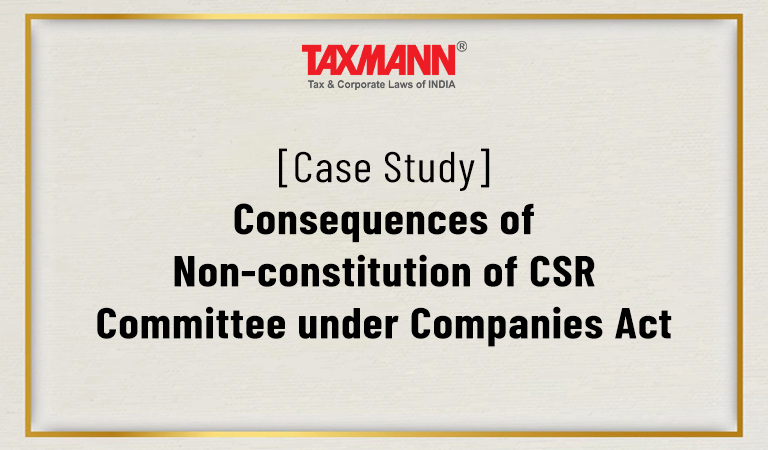[Case Study] Consequences of Non-constitution of CSR Committee under Companies Act
- Blog|News|Company Law|
- 3 Min Read
- By Taxmann
- |
- Last Updated on 17 November, 2022

[2022] 145 taxmann.com 7 (Article)
1. Corporate Social Responsibilities (CSR)
Corporate social responsibilities is a self-regulatory business model that helps a company be socially accountable to itself, its stakeholders, and the public. The concept of corporate social responsibilities has evolved over the years, and it is now used as a strategy and a business opportunity to earn stakeholders’ goodwill. Corporate social responsibilities is generally understood as being the way through which a company achieves a balance of economic, environmental, and social imperatives (“Triple-Bottom-Line- Approach”), while at the same time addressing the expectations of shareholders and stakeholders. Corporate social responsibilities is the heart and soul of modern corporations and is an important standard for corporate governance.
The companies in which the corporate social responsibilities provisions are applicable, is required to constitute a corporate social responsibilities Committee which shall have to formulate corporate social responsibilities policy and recommend activities to be undertaken by the company, amount to be sent in such policy and also monitor the corporate social responsibilities policy of the company.
2. Legal Framework of CSR under Companies Act 2013
It may be recalled that in 2014, India became the second country (after Mauritius) in the world to mandate spend on corporate social responsibilities by introducing specific provisions in company law and the following are the rules and regulations governing the corporate social responsibilities.
(a) Section 135 of the Companies Act 2013
(b) The Companies (CSR Policy) Rules 2014 and
(c) Schedule VII of the Companies Act 2013.
3. Relevant provision on constitution of CSR committee under Companies Act 2013
Sub-section (1) of section 135 of the Companies Act 2013 provides that every company having net worth of rupees five hundred crore or more, or turnover of rupees one thousand crore or more or a net profit of rupees five crore or more during the immediately preceding financial year shall constitute a corporate social responsibility committee of the board consisting of three or more directors, out of which at least one director shall be an Independent director.
4. Penal provisions for non-compliance/default
In terms of the provisions of section 450 vide The Companies (Amendment) Act, 2020 amendment which is effective from 21st December, 2020 punishment where no specific penalty or punishment is provided: If a company or any officer of a company or any other person contravenes any of the provisions of this Act or the rules made thereunder, or any condition, limitation or restriction subject to which any approval, sanction, consent, confirmation, recognition, direction or exemption in relation to any matter has been accorded, given or granted, and for which no penalty or punishment is provided elsewhere in this Act, the company and every officer of the company who is in default or such other person shall be liable to a penalty of ten thousand rupees, and in case of continuing contravention, with a further penalty of one thousand rupees for each day after the first during which the contravention continues, subject to a maximum of two lakh rupees in case of a company and fifty thousand rupees in case of an officer who is in default or any other person.
5. Consequences of default/violation – action from the Regulator
To understand the consequences of any default in complying with the constitution of the CSR Committee under section 135 of the Companies Act 2013, let us go through one of the decided case law on this matter on 18th February 2022 by the Registrar of Companies of Pune of Maharashtra state.
Click Here To Read The Full Article
Disclaimer: The content/information published on the website is only for general information of the user and shall not be construed as legal advice. While the Taxmann has exercised reasonable efforts to ensure the veracity of information/content published, Taxmann shall be under no liability in any manner whatsoever for incorrect information, if any.

Taxmann Publications has a dedicated in-house Research & Editorial Team. This team consists of a team of Chartered Accountants, Company Secretaries, and Lawyers. This team works under the guidance and supervision of editor-in-chief Mr Rakesh Bhargava.
The Research and Editorial Team is responsible for developing reliable and accurate content for the readers. The team follows the six-sigma approach to achieve the benchmark of zero error in its publications and research platforms. The team ensures that the following publication guidelines are thoroughly followed while developing the content:
- The statutory material is obtained only from the authorized and reliable sources
- All the latest developments in the judicial and legislative fields are covered
- Prepare the analytical write-ups on current, controversial, and important issues to help the readers to understand the concept and its implications
- Every content published by Taxmann is complete, accurate and lucid
- All evidence-based statements are supported with proper reference to Section, Circular No., Notification No. or citations
- The golden rules of grammar, style and consistency are thoroughly followed
- Font and size that’s easy to read and remain consistent across all imprint and digital publications are applied



 CA | CS | CMA
CA | CS | CMA
